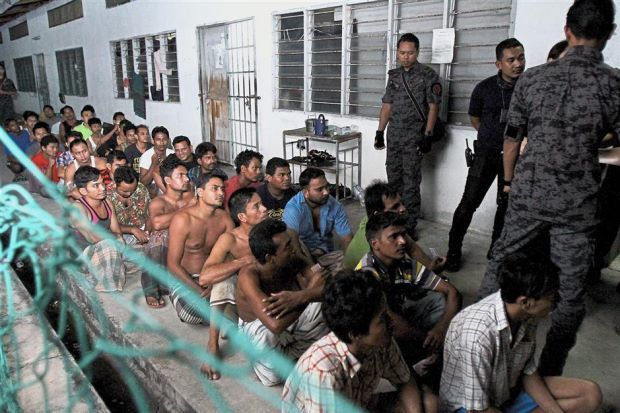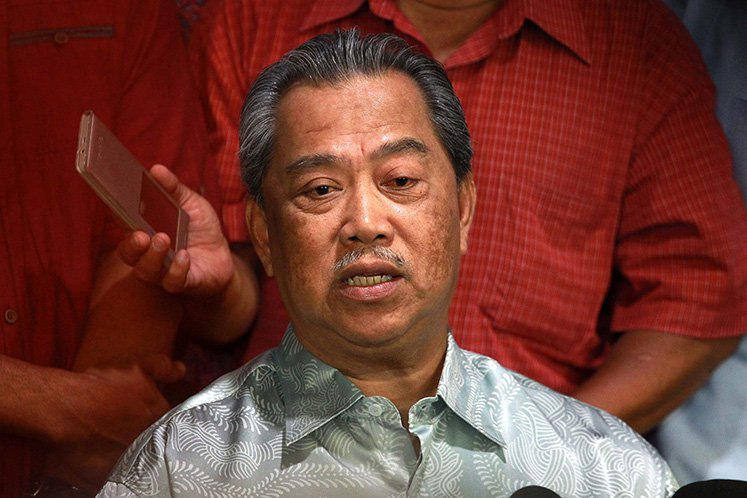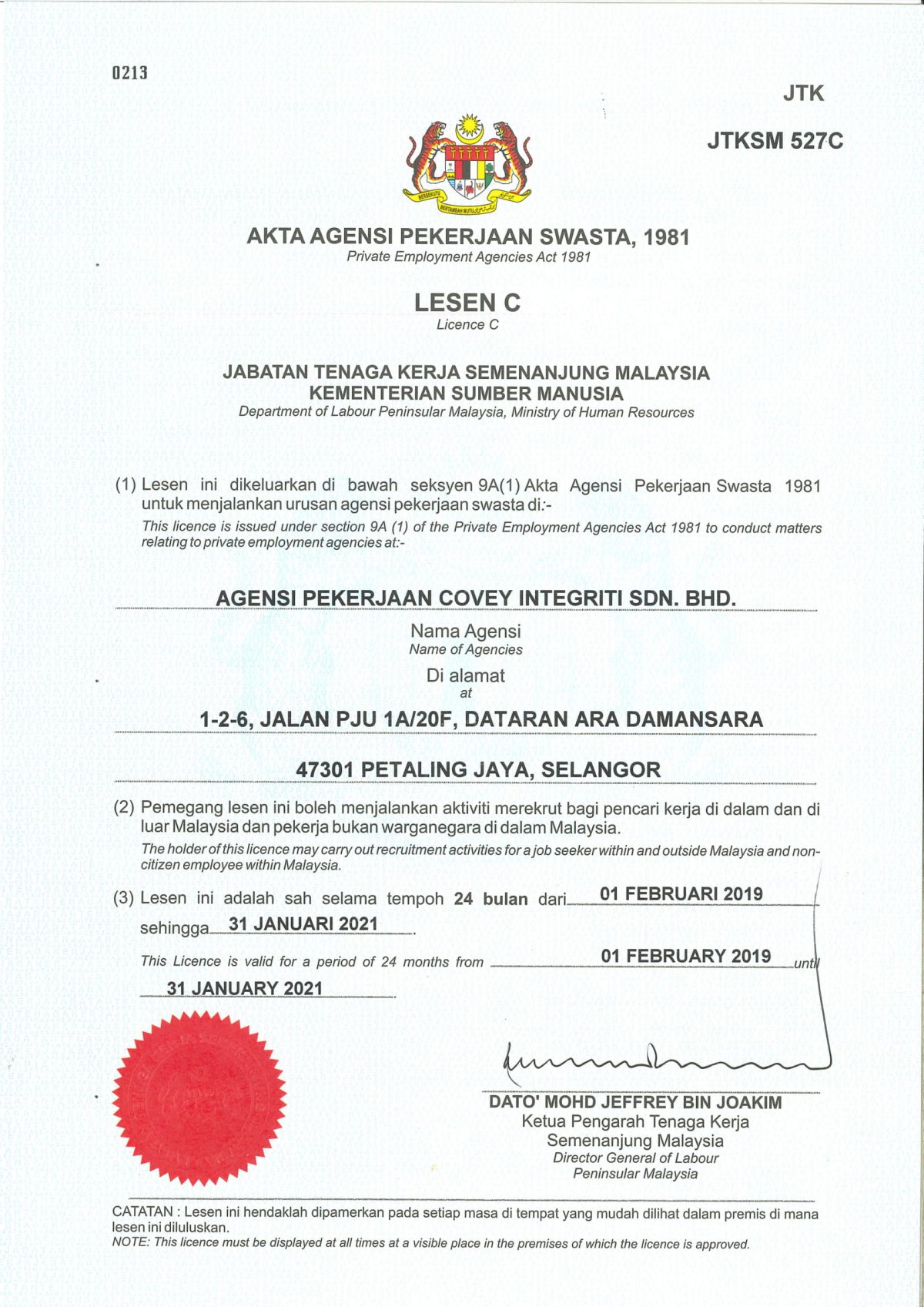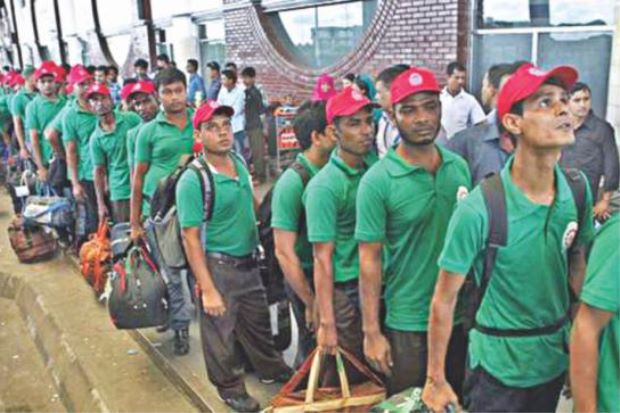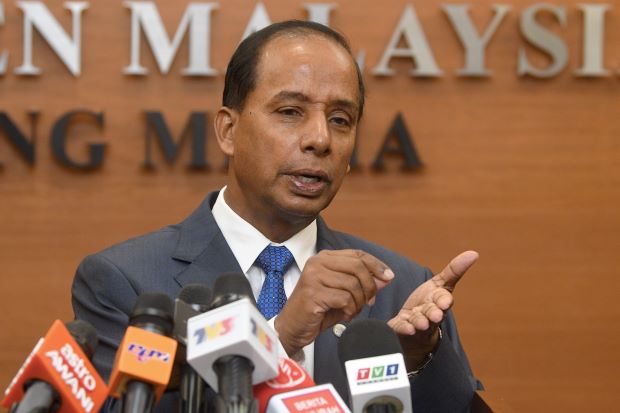DHAKA (The Statesman/Asia News Network): The previous Najib Razak-led Malaysian government had created the manpower syndicate which “monopolised” the recruitment of Bangladeshi workers in the Southeast Asian country, according to officials and documents obtained by The Daily Star.
Following the Andaman boat crisis in 2015, Malaysia’s then home minister Ahmad Zahid Hamidi said worker recruitment would be done through the private sector instead of the state-level mechanism, G2G.
During bilateral negotiations, Bangladesh had proposed the names of 745 recruiting agencies, but Malaysia selected only 10 without providing any basis for it.
In a letter dated January 9, 2017, Richard Riot anak Jaem, Malaysia’s human resource minister, sent Dhaka the list of the 10.
“So, Bangladesh succumbed to Malaysia’s proposal.”
Additionally, a Bangladeshi-born businessman was allegedly behind the syndicate’s formation, and all 10 agencies in i began charging higher fees, according to industry insiders.
The new G2G Plus deal was signed in early 2016.
The syndicate was thriving until the new Malaysian government suspended recruitment from Bangladesh on September 1 this year following allegations of widespread irregularities against the syndicate.
On October 30, the High Court directed the Bangladesh government to form an inter-ministerial committee to investigate “the monopoly” and submit a probe report in six months.
The court came up with the order and rule following a writ petition filed by 10 recruitment agencies, which contested the arbitrary selection of the other 10 and deprived other licensed agencies of running a lawful trade guaranteed by the constitution.
The syndicate of agents accused is: Noor Ali of Unique Eastern Pvt Ltd, Ruhul Amin of Catharsis International, Ghulam Mustafa of Prantik Travels & Tourism Ltd, Mohammed Bashir of Rabbi International, Zainal Abedin Zafar of Al Islam Overseas, Ruhul Amin of Amin Tours & Travels, ASM Khairul Amin of Career Overseas Consultants Ltd, Tuhin Siddiquue Ome of ISMT Human Resources Development Ltd, Arif Alam of Passage Associates and Shaikh Abdullah of Shanjari International.
Bangladesh and Malaysia are now working to design a new recruitment system.
THE MAN IN THE SHADOWS
After the 10 agencies were selected, leaders of Baira held a meeting at The Vintage Room of Gulshan Club on August 2 last year. They were against the syndicate and wanted to convince one Dato Amin to break it.
Dato Amin or Datuk Seri Mohd Amin Bin Abdul Nor, who was granted Malaysian Permanent Resident status, was the Bangladeshi man considered to be a major player in this industry. The title, Datuk Seri, conferred upon him by the Malaysian government was testament to his importance.
The meeting minutes obtained by this paper show that Baira’s then finance secretary Mohammad Fakhrul Islam asked how paying only RM 5,000 to Amin would ensure that all agents could be engaged in the recruitment business.
Baira then sent a delegation to Amin in Malaysia to convince him to break the syndicate in early August, 2017, but its effort bore no fruit.
Amin is the president and group CEO of a Malaysia-based firm Bestinet that developed, maintains and operates the Foreign Workers Centralised Management System (FWCMS) software, used by the Malaysian home ministry for managing foreign workers and processing their documents.
Amin was also allegedly behind the creation of Synerflux, another IT firm that provided an online registration system Sistem Perkhidmatan Pekerja Asing (SPPA), the only one that can be used to hire Bangladeshi workers.
Former Malaysian home minister Ahmad Zahid Hamidi gave the contract to Synerflux under the Official Secrets Act in 2016.
“It was the system through which the recruitment was monopolised and manipulated,” said an agent in Dhaka, wishing not to be named.
Malaysia’s home ministry used the FWCMC for recruitment of foreign workers from all the labour-sending countries, including Bangladesh. However, those wanting Bangladeshi workers, had to again apply through SPPA, according to recruiting agents in Dhaka and Kuala Lumpur.
The SPPA would allocate recruitment jobs only to the 10 agents, and that’s how the total monopoly was created, they told The Daily Star.
Hamidi and first lady Rosmah Mansor are now facing dozens of cases, including that of abusing power in foreign worker recruitment and money laundering.
Meanwhile, Amin has not responded to email queries over the allegations against him.
MONEY NOT MIGRANTS
Noor Ali, managing director of Unique Eastern, one of the 10 recruiting agencies, admitted that the recruitment cost was high but said they had no control over it.
“Jobseekers don’t come to us directly. They go to the brokers…there are six to seven layers of brokers. So, we cannot control the cost,” he said at a press conference organised by the controversial 10 agents at The Westin Dhaka on August 30.
Tian Chua, vice president of People’s Justice Party, a component of the now ruling Pakatan Harapan coalition, said migrant workers’ recruitment was a lucrative business in Malaysia during the previous regime.
“A lot of politically connected agencies are making money out of that,” he told this correspondent at the One World Hotel in Kuala Lumpur on September 18.
“The problem is the people who bring the migrants, don’t employ them. Their objective is only to import migrants and make money against each migrant,” Chua said, adding that the present Malaysian government was working to bring discipline to the foreign worker recruitment sector.
Where an aspirant migrant worker was supposed to pay an official amount of Tk 37,000 as per the G-to-G Plus deal, the agents in collaboration with the sub agents and touts, charged Tk 3.5 to Tk 4 lakh from each of them.
The recruitment cost went up to RM 20,000 or Tk 400,000 from each migrant, Malaysian newspaper The Star reported on June 22 this year.
Considering two lakh Bangladeshis migrated to Malaysia since early 2017, the syndicate raked in Tk 8,000 crore. Of that, Tk 4,000 was laundered to Malaysia, industry insiders in Dhaka and Kuala Lumpur told The Daily Star.
The recruitment process got murkier as Malaysian employers had to depend on the agents or brokers to get the applications for Bangladeshi workers approved.
“Most of the employers had some level of problems in company documents, including financial reports. Therefore, the brokers had to bribe certain home ministry officials for getting the applications approved,” a Bangladeshi broker in Malaysia said.
THE BREAKDOWN
The bribe on average was Malaysian Ringgit (RM) 1,500 per worker. Even, the human resources managers of the employing companies had to be bribed around an average of around RM 1,000, the broker said.
“The agents and sub-agents in Malaysia got an average RM 2,500 as commission.
“These transactions have no documents, but that’s the fact.”
Even the fees that the employers were supposed to pay the Malaysian government for recruiting workers came from the migrants, the broker said.
On the Bangladesh end, sub-agents had to pay Tk 1.8 lakh (RM 9,000) per worker to the syndicate members. Of that, Tk 1 lakh (RM 5,000) was sent to Amin in Malaysia via hundi.
Amin apparently shared the amount with the “powerful politicians” of Malaysia, industry insiders alleged.
Of the remaining Tk 80,000 (RM 4,000), the syndicate members took Tk 40,000 as commission and the rest was spent for processing the workers’ documents.
Certain political elements and officials in Bangladesh also received a portion of the bribes, they said.
Several layers of brokers and sub-agents in Bangladesh also collected an average of Tk 2.2 lakh per worker. Around Tk 100,000 of it was sent to Malaysia via hundi for the human resources managers of the employing companies, brokers and certain officials.
“That’s how the cost of recruitment under the G2G Plus went up to Tk 4 lakh,” an agent said, adding that it was an irony that the online systems aimed at avoiding middlemen, lowering recruitment cost and curbing exploitation fed the practice instead.
Bangladesh’s expatriates’ welfare minister Nurul Islam, however, only blamed Malaysia for the syndicate.
After repeated questions from journalists at a press conference on August 28, he said the ministry would issue show cause notices to the syndicate members and was “collecting data”.
Contacted on October 10, Dr Ahmed Munirus Salehin, additional secretary (employment) at the ministry, said, “No, we haven’t served any notice.” – The Statesman/Asia News Network

